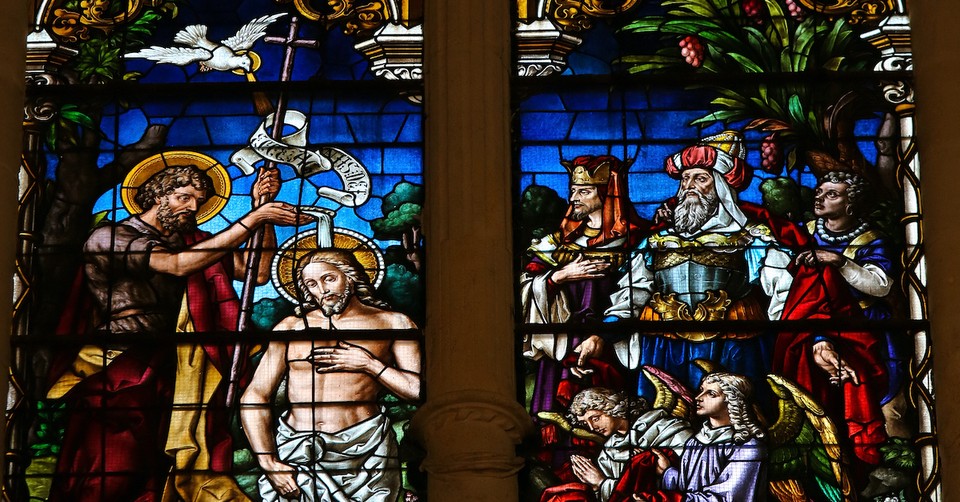3 Powerful Lessons from the Baptism of Jesus

Jesus' baptism is recorded by the Holy Spirit in each of the Gospel accounts because it is an incomparable event in salvationi history, essential to God's eternal plan of salvation, by identifying Jesus of Nazareth as Messiah, according to Old Testament Law and prophecy. Let us reflect on a theology of that blessed event, the meaning of the event, and the lessons for every believer—indeed, all humanity—from Jesus' baptism.
Summary of Jesus' Baptism
The baptism of Jesus is a significant event in the New Testament, recorded in the Gospels of Matthew, Mark, and Luke. Jesus' baptism takes place in the Jordan River, a location known for its symbolic significance in Jewish history. John the Baptist, a prophetic figure calling for repentance and the coming of the Messiah, is performing baptisms in the river.
Matthew 3:13-17: Jesus travels from Galilee to the Jordan to be baptized by John. Initially, John hesitates, saying he needs to be baptized by Jesus instead. However, Jesus insists, stating it is necessary to "fulfill all righteousness." Upon Jesus' baptism, the heavens open, and the Spirit of God descends like a dove, alighting on him. A voice from heaven declares, "This is my Son, whom I love; with him I am well pleased."
Mark 1:9-11: Mark's account is more concise. Jesus is baptized by John in the Jordan, and as he emerges from the water, he sees the heavens being torn open and the Spirit descending like a dove. A voice from heaven proclaims, "You are my Son, whom I love; with you I am well pleased."
Luke 3:21-22: Luke notes that Jesus is praying as he is baptized. The heavens open, the Holy Spirit descends on him in bodily form like a dove, and a voice from heaven says, "You are my Son, whom I love; with you I am well pleased."
What Happened during Jesus' Baptism?
Jesus approached His cousin, John, called, “the baptizer,” at age 30, to inaugurate His Heavenly Father's covenantal promise, His mission for the cosmos: to bring about a New Heaven and a New Earth—a Kingdom of righteousness that would be “Paradise [Eden] regained.” (Luke is the Gospel writer who emphasizes Jesus' age, as well as his lineage. This, too, is in support of the reason for the event: Jesus was being ordained as High Priest of God for the people of God. See Luke 3:23-28.)
We must recognize Jesus' intent to receive this “passive” sign (i.e., Jesus received the sign from John; He did not apply the sign Himself; anticipating His passive obedience on the cross, i.e., He was crucified for our sins, rather than conducting a self-sacrifice by martyr-manipulation, or suicide) in relation to God's covenant of grace, whereby, God would provide a High Priest and the Lamb—God-in-the-flesh—who would, in one Person, meet the demands of the covenant of works—obey God's Law perfectly, and, also, become the atoning sacrifice for sin—ushering in an everlasting Kingdom of peace.
Thus, the baptism of our Lord is a remarkable and indispensable milestone in the plan of salvation; one that was sweeping in its cosmic ramifications, comprehensive in its covenantal efficacy, and necessary to fulfill a multidimensional ministry for humanity and creation.
During the baptism, the Holy Spirit descended on Jesus in the form of a dove. And the Father declared from heaven, "This is my beloved. Son, with whom I am well pleased."
Understanding the Importance
When baptizing Jesus, John was applying a sign of repentance—a ceremonial washing with water—prescribed and conducted in the Old Testament. John was conducting this liturgical act as a sacramental act of preparing Israel for the coming of the Messiah. Upon Jesus' approach to His cousin, John gives evidence to the central covenantal and prophetic presence of Jesus: “Behold, the Lamb of God who takes away the sins of the world” (John 1:29).
Though rightly hesitant to apply the baptism to Jesus, John was practicing an Old Testament ceremonial “washing with water” as a sign of repentance from sin (remember: John the Baptist was the last Old Covenant prophet), to the sinless Son of God. Jesus redirects the moment and the ministry from repentance of sin to identification and inauguration or, in a word, ordination. Thus, Jesus fulfilled the Law necessary for His central role in God's mission, as a High Priest after the Order of Melchizedek.
As Duane Spencer points out in his Holy Baptism, this explains what Jesus meant when He said that His baptism was part of “fulfilling all righteousness” (Matt. 3:15): Jesus fulfilled righteousness by undergoing baptism into the priesthood. Perhaps, no single scholar has focused our attention to the necessity of the baptism of Jesus with the priesthood of all believers than Dr. Hank Vos of Taylor University:
"If evangelical Protestants wish to reengage with the Great Tradition's emphasis on baptism as ordination to the royal priesthood, then there are at least four lessons to glean from Matthew's narrative of Jesus' baptism. Baptism must be understood in Christocentric-Trinitarian perspective. Beginning with Christ's paradigmatic baptism, it there attends to the activity of the Father, the Son, and the Spirit."
Consider the meaning of Jesus' baptism by noting the incontrovertible evidence present in the text:
Jesus was not of the priestly line, but John was. Jesus was from the kingly line of Judah; John was from the line of Aaron, and his father, Zachariah, was a high priest. In a similar way, we were baptized into Christ to become priests of God through Christ, our High Priest.
Jesus was around 30 years old—the required age for a candidate to be presented to another priest for ordination; the house, Jesus inaugurated His public ministry by assuming the ceremonials sign marking Him out as a priest of God after the order of Melchizedek.
The baptism and the anointing are based on the same word that is used to denote the sprinkling or pouring on Aaron and his sons.
Many teach the baptism of Jesus to show “identification” with His people. While we do not see this symbolism as the preeminent meaning of Jesus' baptism—it was an undeniable facet of the event. Jesus' identification of High Priest became a secondary meaning in the text: it is a foreshadowing of the High Priest who took the sins of His people on Calvary's Cross.
The Holy Spirit, as a dove, that came from heaven is like the anointing oil of Almighty God flowing over the newly ordained priest. The voice of God the Father is the confirmation to all of His Son's authority. Therefore, what was set forth in obedience to Law in ceremony was revealed with Trinitarian presence in time and space.
Reading even these few words on the baptism of Jesus surely signals to us that this is one of the most beautiful narrative events in all of Scripture. The baptism, or anointing, of our Lord Jesus spans Eternity Past and Eternity Future. The ceremonial act fulfills the signs and symbols anticipated in the Old Testament priesthood and looks toward His substitutionary atonement for sin on the cross. You who believed in Jesus Christ have become members of a new priesthood because you have been baptized into the body of the High Priest, Jesus Christ.
After a cursory review of the theology and meaning of Jesus' baptism, what can we learn as His subjects?
3 Life Lessons from Jesus' Baptism
1. Jesus’ Baptism Teaches Us That There Are Seasons to Faithful Living
Jesus waited. He apparently continued in the employ of His earthly adoptive father, Joseph, or, possibly, assumed responsibilities after Joseph's death. Whatever the reason, our Lord and Savior demonstrated patience. It was not time for Him to begin His public ministry. Each of us can learn that there are seasons of life.
We may want to believe that we can have it all. We may be able to have quite a bit of our dreams or even our calling. However, we most widely receive these opportunities and act on them according to seasons of life. J
esus, in waiting until He was 30 years old, the age of ordination for a priest, demonstrates to us how we, also, should seek the virtue of patience. The Bible says there is a season for all things (Ecc. 3:1). Learn to cultivate your excitement and anticipation for your dream in the present moment. We hallow the gift of time by honoring the ministry of waiting.
2. Jesus’ Baptism Teaches Us That the Sacramental Is Evidenced by the Perceptible
Jesus' baptism was an ordinance involving an inward reality followed by an outward event. The coming of the Holy Spirit and the voice of the Father demonstrated that what was done on earth was approved in heaven. In a similar way, Christians should take the sacraments of the Lord supper and baptism very seriously.
We must realize that these are God's signs of God's plan of salvation for us. Jesus' baptism was an act of sublime submission, a passive activity in which He received God's sign. We too must remember that the sacraments are not our testimony to God but rather God’s testimony to us.
3. Jesus’ Baptism Teaches Us That God’s Plan of Salvation Is God’s Plan, Not Ours
The Lord Jesus submitted to God's plan. He did so in order that righteousness might be fulfilled, so you and I must remember that we are saved according to God's plan. We grow through the means of grace appointed to us: word, sacrament, and prayer. God has prescribed how we are to be saved and how to grow in Christ through all the days of our lives. Christianity is not a privatized endeavor but is rather a divinely mandated commission: “teaching them whatsoever I have commanded” (Matt. 28:20).
In conclusion, the humility, obedience, and patience of our Lord at His baptism, call us to a new way of life; a way that is created, sustained, and regulated by God. To surrender in humility to the Lord's divine design for our lives, provides the unequivocal answer to one of the most frequently asked questions: “How do I know God's will for my life?“ God's will for your life begins with His Word in the Scriptures.
We must turn from reliance upon anyone or anything other than the Lamb of God, Jesus Christ our High Priest. Trusting Him who is God's provision for your righteousness and for the atonement of your sins. Believe and confess His resurrection. Follow Him through the means of grace He provided for us in the Scriptures, the sacraments, and in prayer. These are the precious lessons from the baptism of Jesus.
BIBLIOGRAPHY
- Biblestudytools.com, “The Baptism of Jesus - Bible Story Verses & Meaning”
- Caneday, Ardel B. “Christ’s Baptism and Crucifixion: The Anointing and Enthronement of God’s Son.” Southern Baptist Journal of Theology 8, no. 3 (2004): 70–81.
- Leithart, Peter. “Jesus' Baptism Into Priesthood”
- Milton, John. Paradise Regained, Samson Agonistes, and the Complete Shorter Poems.
- Vos, Hank. The Priesthood of All Believers and the Missio Dei: A Canonical, Catholic, and Contextual Perspective.
Photo credit: ©GettyImages/Jorisvo, Stained glass window depicting the Baptism of Jesus by Saint John in the cathedral of Burgos, Castille, Spain.

Originally published October 13, 2020.




